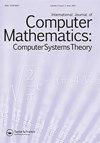矩阵乘法近似双线性计算的随机化
IF 0.6
Q3 COMPUTER SCIENCE, THEORY & METHODS
International Journal of Computer Mathematics: Computer Systems Theory
Pub Date : 2019-05-17
DOI:10.1080/23799927.2020.1861104
引用次数: 1
摘要
摘要提出了一种不增加计算复杂度的矩阵乘积双线性计算随机化公式的方法。当有两个误差来源时,我们考虑这种随机化的含义。第一个原因是由于计算公式本身只是近似正确的。在数值搜索更快的矩阵乘法算法时,会出现这样的公式。第二个来源是由于使用浮点运算。当在像gpu这样的低精度硬件上进行计算时,这种错误尤其重要。理论和数值实验结果表明,无论这两种误差单独存在还是同时存在,我们的方法都能提高性能。本文章由计算机程序翻译,如有差异,请以英文原文为准。
Randomization of approximate bilinear computation for matrix multiplication
ABSTRACT We present a method for randomizing formulas for bilinear computation of matrix products which does not increase the leading order complexity of the computation. We consider the implications of such randomization when there are two sources of error. The first source is due to the computation formula itself only being approximately correct. Such formulas come up when numerically searching for faster matrix multiplication algorithms. The second source is due to using floating point arithmetic. This kind of error is especially important when computing on low precision hardware like GPUs. Our theoretical results and numerical experiments indicate that our method can improve performance when the two kinds of error are present individually, as well as when they are present at the same time.
求助全文
通过发布文献求助,成功后即可免费获取论文全文。
去求助
来源期刊

International Journal of Computer Mathematics: Computer Systems Theory
Computer Science-Computational Theory and Mathematics
CiteScore
1.80
自引率
0.00%
发文量
11
 求助内容:
求助内容: 应助结果提醒方式:
应助结果提醒方式:


